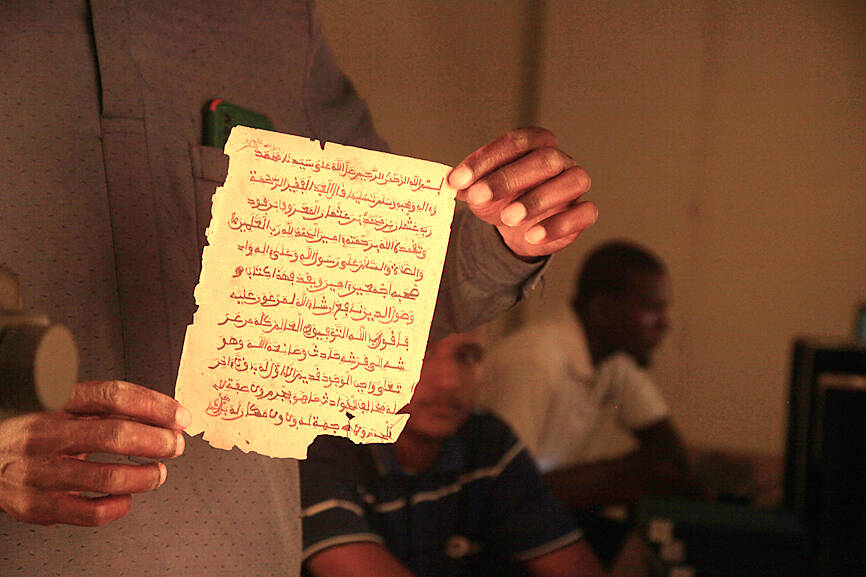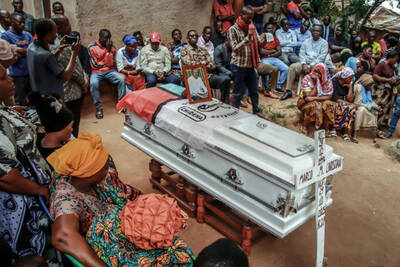Thirteen years ago, Abdoulaye Cisse risked his life to smuggle tens of thousands of fragile manuscripts out of Timbuktu as al-Qaeda-linked extremists swept into the desert town.
At night, he loaded crates of manuscripts from the Ahmed Baba Institute of Higher Islamic Studies and Research onto donkey carts, aware that their pages carried evidence of his people’s glorious past. They were taken to the river, where wooden boats and then buses took them to Mali’s capital, Bamako, a 1,200km journey.
“It was dark, but we knew the route by heart,” said Cisse, the institute’s general secretary.

Photo: AP
Moving the manuscripts took a month. The institute’s staff knew they risked their lives.
The 28,000 manuscripts returned safely to Timbuktu in August after a request from local leaders and civil society. It reflected both the city’s pride in cultural preservation and concerns about the potentially damaging humidity in Bamako. Mali’s government has portrayed it as a victory.
However, al-Qaeda remains a threat. Its fighters attacked Timbuktu as recently as June, and affiliated fighters with the Jama’a Nusrat ul-Islam wa al-Muslimin (JNIM) group have imposed a fuel blockade on landlocked Mali, threatening to bring down the military regime.
Beyond the institute, which is owned by the government, Timbuktu is home to private libraries holding an estimated 377,000 manuscripts in total. All were smuggled to the capital, where they remain.
“What we find in these documents does not exist anywhere else in the world,” said institute director Mohamed Diagayete, who specializes in old manuscripts.
The trove contradicts assumptions that African history has been primarily oral. The manuscripts are an archive of dealings among West African empires and tribes, with histories dating back centuries.
A world comes to life on their pages. Letters between academics and emirs debate whether tobacco was sin or solace, and outline demands by officials to shrink women’s dowries so poor men might marry.
Scribbled notes in the margins detail events that shaped history, such as earthquakes that shook the region in the 15th century.
Timbuktu was once a center of Islamic learning, with academics also coming to study mathematics, science, astrology and governance.
The manuscripts offer evidence that Islam in the region was long marked by tolerance and respect. One manuscript in a private library records a local decree warning men not to impose themselves on women, and granting women the right to seek justice if they do.
The brutality of al-Qaeda’s arrival in 2012 was a shock. The militants destroyed more than 4,000 manuscripts, some dating back to the 13th century, the findings of a UN expert mission said. They also destroyed the mausoleums of Timbuktu, which are listed as UNESCO World Heritage Sites, and the city’s “sacred gate.”
Al-Qaeda’s rampage was a wake-up call for protecting Timbuktu’s treasures.
Before the manuscripts were smuggled out of the city, only 20 percent of the institute’s manuscripts had been digitized, Cisse said.
Now nearly all are digitized, and the archives are backed up on servers based elsewhere.
“Even if one server is damaged, we can still recover these manuscripts,” he said.
Archivists and librarians say challenges remain.
The manuscripts are still stored in aging mud-brick libraries, though staffers of the institute say their holdings are now in “a secure place.” They plan to install surveillance cameras inside.
Timbuktu’s history-loving residents try to balance protection with accessibility.
“As long as these manuscripts remain in trunks, they remain dead because people cannot enjoy them,” said Sane Chirfi Alpha, a founding member of a local nonprofit SAVAMA-DCI for their preservation.
For students like 24-year-old Baylaly Mahamane, the manuscripts offer fresh insights from traditional practices.
One text describes doctors crushing white wormwood leaves to soothe the stomach, blending millet with mutton to stop vomiting and packing swollen feet with clay and henna.
“I want to study the Timbuktu manuscripts on herbal medicine so that I can help doctors in Timbuktu hospitals treat patients who cannot obtain medication at home,” Mahamane said.

Philippine President Ferdinand Marcos Jr yesterday vowed that those behind bogus flood control projects would be arrested before Christmas, days after deadly back-to-back typhoons left swathes of the country underwater. Scores of construction firm owners, government officials and lawmakers — including Marcos’ cousin congressman — have been accused of pocketing funds for substandard or so-called “ghost” infrastructure projects. The Philippine Department of Finance has estimated the nation’s economy lost up to 118.5 billion pesos (US$2 billion) since 2023 due to corruption in flood control projects. Criminal cases against most of the people implicated are nearly complete, Marcos told reporters. “We don’t file cases for

Ecuadorans are today to vote on whether to allow the return of foreign military bases and the drafting of a new constitution that could give the country’s president more power. Voters are to decide on the presence of foreign military bases, which have been banned on Ecuadoran soil since 2008. A “yes” vote would likely bring the return of the US military to the Manta air base on the Pacific coast — once a hub for US anti-drug operations. Other questions concern ending public funding for political parties, reducing the number of lawmakers and creating an elected body that would

‘ATTACK ON CIVILIZATION’: The culture ministry released drawings of six missing statues representing the Roman goddess of Venus, the tallest of which was 40cm Investigators believe that the theft of several ancient statues dating back to the Roman era from Syria’s national museum was likely the work of an individual, not an organized gang, officials said on Wednesday. The National Museum of Damascus was closed after the heist was discovered early on Monday. The museum had reopened in January as the country recovers from a 14-year civil war and the fall of the 54-year al-Assad dynasty last year. On Wednesday, a security vehicle was parked outside the main gate of the museum in central Damascus while security guards stood nearby. People were not allowed in because

Tanzanian politicians are in shock over the massacre of hundreds of young protesters during its recent election, insiders told Agence France-Presse, but are too afraid to speak out as a tiny cabal around the president takes control. Gruesome images of dead Tanzanians have flooded the Internet in the wake of the Oct. 29 elections that triggered widespread protests over government repression. Tanzanian President Samia Suluhu Hassan officially won with 98 percent of the vote, but key opposition leaders were jailed or disqualified. The opposition said that more than 1,000 people were killed as security forces crushed the protests under cover of a five-day